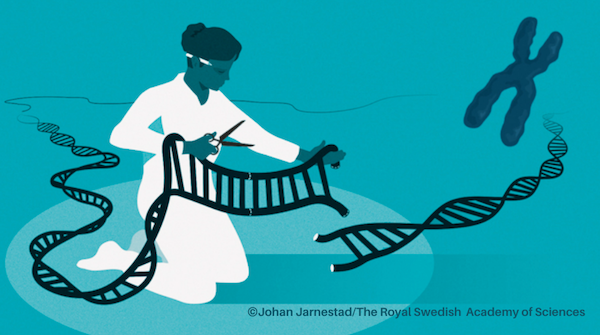
Above: Emmanuelle Charpentier (left) and Jennifer A. Doudna. (credit: Bianca Fioretti, Hallbauer & Fioretti, copyright owned by Emmanuelle Charpentier who made it a Creative Commons picture; Duncan.Hull via Creative Commons.)
This year’s Nobel Prize in Chemistry has been awarded to Emmanuelle Charpentier and Jennifer A. Doudna “for the develop of a method for genome editing.”
The two scientists’ discovery of the CRISPR/Cas9 genetic scissors has allowed researchers to change the DNA of animals, plants, and microorganisms with extremely high precision. This revolutionary discovery has allowed scientists to edit DNA within a few weeks, which used to be time consuming or, in some cases, impossible.
“There is enormous power in this genetic tool, which affects us all. It has not only revolutionized basic science, but also resulted in innovative crops and will lead to ground-breaking new medical treatments,” says Claes Gustafsson, chair of the Nobel Committee for Chemistry.
The collaboration behind the award
The CRISPR/Cas9 genetic scissors resulted from a collaboration between Emmanuelle Charpentier (Max Planck Unit for the Science of Pathogens, Berlin, Germany), and Jennifer Doudna, (University of California, Berkeley, USA). Following Charpentier’s research on Streptococcus pygenes, in which she discovered a previously unknown molecule, tracrRNA. Her work showed that tracrRNA is part of bacteria’s ancient immune system, CRISPR/Cas, that disarms viruses by cleaving their DNA.

After publishing this work in 2011, Charpentier undertook a collaboration with Jennifer Doudna, an experienced biochemist with a vast knowledge of RNA, and the two showed that the genetic scissors could be controlled to precisely cut any DNA molecule at a predetermined site, allowing the DNA to be rewritten at that location.
A scientific revolution unleashed
This discovery has unleashed an explosion of related work, which has allowed scientists across the life sciences to develop and seek everything from improved crops to cancer therapies, and has unlocked the possibility of curing inherited diseases.
AIChE congratulates both on their achievements. We are especially proud to have had Jennifer Doudna participate in conferences produced by the Society of Biological Engineers (SBE), and to have had Emmanuelle Charpentier’s work presented at SBE conferences.
Presented by the Society for Biological Engineering (SBE), the 4th International Conference on CRISPR Technologies conference will bring together academics and industry representatives to highlight the cutting edge of these developments and the most immediate technical and societal changes. Learn more.


